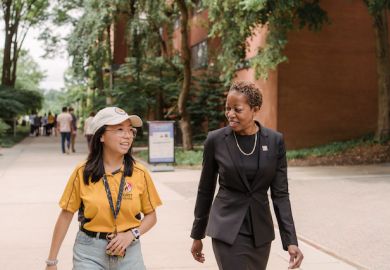US university faculty will never become representative of the racial make-up of the wider population at the current rate of progress, new analysis warns.
Writing in Nature Human Behaviour, three researchers flag that the proportion of underrepresented tenure-track faculty has increased by 0.23 percentage points each year on average between 2013 and 2020, when the US census projects that the percentage of these groups in the wider population will increase by 0.2 percentage points annually.
“At this rate, US higher education will never achieve demographic parity among tenure-track faculty,” write the trio, Nathan Matias, Neil Lewis and Elan Hope.
One common claim is that there is a “pipeline problem” with making academia more representative – that there are too few PhD graduates of colour to fill faculty ranks, and therefore that “demographic parity would require a multigenerational effort to increase the number of available candidates”.
But the paper, published on 5 December, debunks this by estimating that between 2013 and 2020 some 45,309 people from underrepresented groups who had PhDs granted by US universities were not hired into tenure-track positions, with the total increasing by 3,394 per year on average during this time.
“Overall, since 2007, the number of unhired individuals with PhDs who are from underrepresented groups is equivalent to 10.58 per cent of all tenure-track faculty in the USA in 2020. Clearly, there has been an increase in the pool of qualified candidates from underrepresented groups,” the paper says.
The researchers argue that, far from being a multigenerational effort, the sector could reach demographic parity by 2050 if it increased the proportion of tenure-track roles held by underrepresented faculty by 1 percentage point per year, an increase of 0.78 percentage points on the current rate of change.
But they say that this will require a collective effort, noting that current institutional initiatives, such as cluster hiring, often achieve diversity goals by poaching minority faculty from other institutions, failing to increase the broader pool of underrepresented faculty.
“These problems did not emerge out of thin air: they are the result of a longstanding history of racism in higher education,” the paper says.
“The sector must acknowledge and address that history and its contemporary implications for how the sector values the work of faculty of colour. US higher education must commit to empowering leaders who do more than talk about these issues; the sector needs leaders who will change policies and practices to address these issues and commit commensurate resources to efforts to reach demographic parity.
“This commitment must be shared across institutions to make meaningful shifts towards parity by 2050.”
Dr Matias, an assistant professor in Cornell University’s department of communication, told Times Higher Education that US universities justified their diversity goals through both moral reasons – that it is the right thing to do – and instrumental ones.
“Instrumentally, a diverse faculty improves higher education’s ability to achieve its purpose of excellence in education and research,” he said.
“This instrumental view of diversity has become so orthodox in the US that people sometimes need reminding of the moral reasons too.”
Register to continue
Why register?
- Registration is free and only takes a moment
- Once registered, you can read 3 articles a month
- Sign up for our newsletter
Subscribe
Or subscribe for unlimited access to:
- Unlimited access to news, views, insights & reviews
- Digital editions
- Digital access to THE’s university and college rankings analysis
Already registered or a current subscriber? Login








